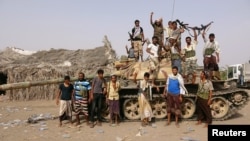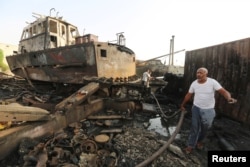Saudi-led coalition forces began the battle Wednesday to push Yemen's Iranian-backed Houthi militia fighters out of the Red Sea port of Hodeida, the main supply route to the capital, Sanaa. The offensive came as a deadline set by the coalition for the Houthis to hand control of the city to the United Nations expired.
Arab media showed video of coalition forces advancing along the road into Hodeida, amid a heavy volley of gunfire, early Wednesday. Coalition warplanes also bombed targets inside the city, according to aid agency CARE.
Saudi-owned Al-Arabiya TV reported that coalition forces had come within five kilometers of Hodeida's international airport, and that a number of farms along the road into the city had been captured.
Pro-Houthi media said a ship belonging to coalition partner the United Arab Emirates, that was approaching the port, was hit by Houthi missiles. VOA could not independently confirm the claim.
UAE Foreign Minister Anwar Gargash told Dubai-based newspaper The National that the purpose of the operation to capture Hodeida was to resolve the conflict in Yemen.
"The Houthis," he said, "have been one of the main impediments to reaching an agreement ... [but] we are changing the calculus through military pressure [on them] in order to bring about a political solution [in Yemen]."
The Saudi coalition accuses Iran of using Hodeida to smuggle rockets to the Houthis. Coalition spokesman Col. Turki al Maliki said passports and counterfeit currency were also among the contraband items.
He said the Houthis were trying to smuggle $22 million in forged Yemeni currency, in addition to over 5,000 passports for leaders of the Houthi militia through the port of Hodeida.
Hilal Khashan, who teaches political science at the American University of Beirut, said humanitarian groups and the United Nations have voiced opposition to a Saudi-coalition attack on Hodeida.
But he told VOA he thinks the coalition will try to capture just the port and avoid urban areas to limit casualties.
"The objective of the operation would be to take over the harbor without moving into the city proper and ensuring adequate food supplies to the people in Hodeida and Sanaa," he said.
Khashan said he believes Iran might be more willing to pressure the Houthis to compromise.
"Iran is under pressure," he noted, "especially after the deal between the U.S. and North Korea about denuclearization, so I think the Iranians may be prone to showing some signs of flexibility and initiating serious talks about Yemen."
Washington-based Gulf analyst Theodore Karasik said preparations for the Hodeida operation by the Saudi-led alliance have "been in the works for over a year."
He said "serious behind-the-scenes negotiations by numerous parties, including the Omanis," paved the way for the operation, along with a "pullout of the bulk of Houthi fighters from the city."
Karasik said the Houthis are now attempting "to negotiate a lifeline via the port," once the operation is over.






